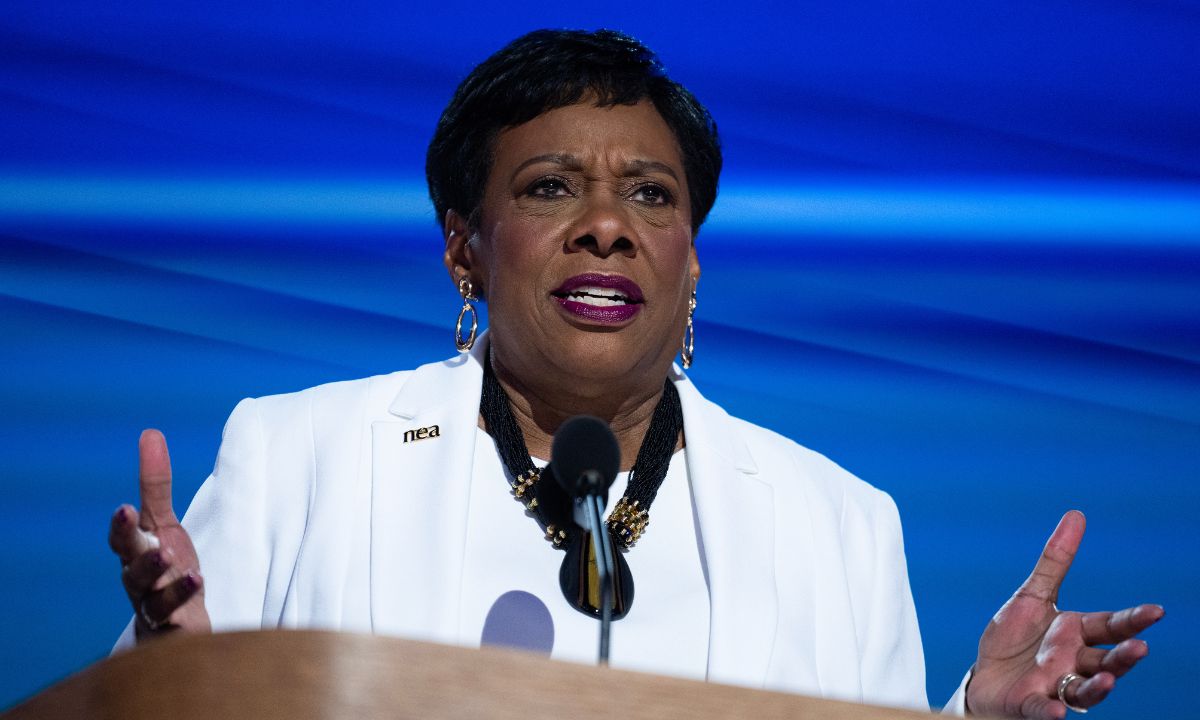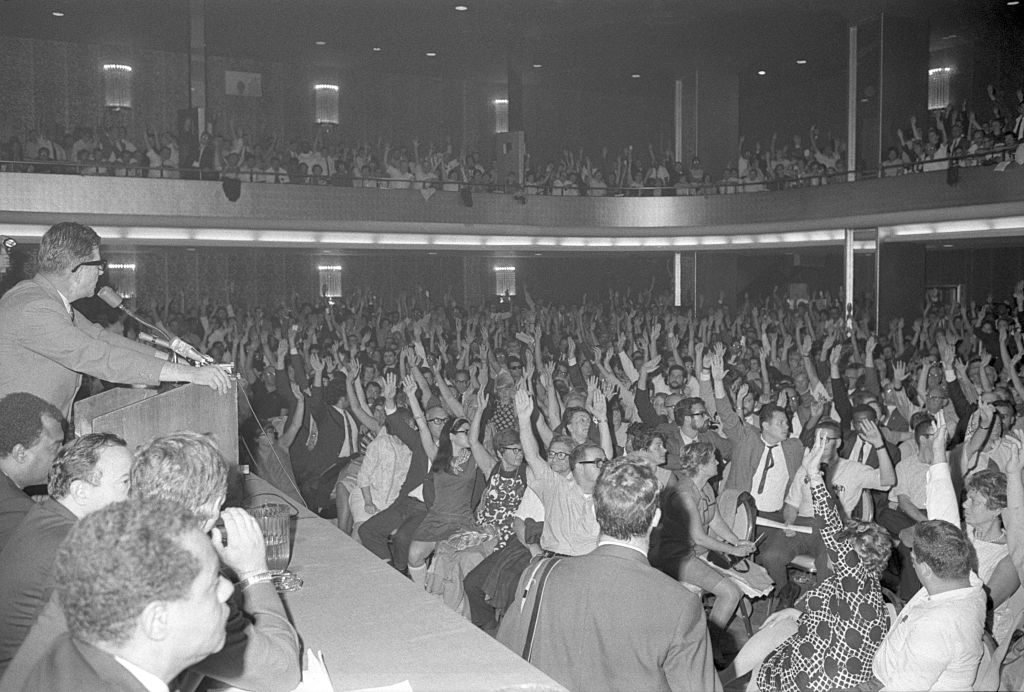Antisemitism Row Shakes NEA and Reignites GOP Push to Revoke Its Charter
The nation’s largest teachers union voted to break with the Anti-Defamation League, then reversed course — spurring Republicans to push for sanctions.

Get stories like this delivered straight to your inbox. Sign up for The 74 Newsletter
Already at odds over Israel’s war in Gaza, the National Education Association is divided again this summer over a highly contested attempt to prohibit all engagement with the Anti-Defamation League, a prominent nonprofit dedicated to fighting antisemitism.
Delegates to the organization’s representative assembly last month narrowly voted to cease the use of educational materials created by the Jewish advocacy group. They also sought to bar the union from participating in programs led by the ADL or publicizing its professional development opportunities. But the NEA’s executive commission rejected the proposal days later following protests from hundreds of Jewish organizations.
The episode reopened an ongoing clash among the 3 million school employees represented by the union — the largest in the country by far — over numerous armed conflicts in the Middle East, alleged prejudice against both Jews and Arabs at home and how schools should teach about both.
Teachers’ unions have long debated controversies related to Israel, a trend that escalated rapidly in the wake of Hamas’ attack on the country Oct. 7, 2023, and the war that followed. But with the Trump administration aggressively investigating claims of antisemitism in education, the about-face from the NEA suggests that the issue is increasingly viewed as treacherous ground. An ongoing Republican attempt to terminate the union’s congressional charter may be adding still more pressure.
While noting that their decision to scuttle the measure was “in no way an endorsement of the ADL’s full body of work,” the union’s leadership expressed concerns over rising antisemitism, pledging in a statement to carefully review curricula designed to combat it.
“After consideration, it was determined that this proposal would not further NEA’s commitment to academic freedom, our membership or our goals,” the authors concluded.
The delegates’ original motion to disaffiliate came after a series of confrontations with the ADL, which has been vocal in attacking what it deems as hateful and biased content circulated by educators. Throughout 2024 and 2025, the ADL has issued report cards for colleges and universities, accusing them of ignoring antisemitism during student protests against Israel’s wars in Gaza, Lebanon and Iran; their critical grades have occasionally been cited by members of Congress seeking to pressure the institutions into taking more dramatic action against student activists.
The disputes have extended into K–12 schools as well, with the ADL blasting the Massachusetts Teachers Association (an NEA affiliate) for circulating teaching materials it called antisemitic, including images of a dollar bill folded into a Star of David. For their part, the union’s organizers countered that the materials were mischaracterized and that the ADL’s denunciations had triggered death threats to MTA leaders and staff.
Merrie Najimy, a former president of the Massachusetts union who supported the anti-ADL resolution, said in an email that the since-reversed vote at the representative assembly “signals a sea change in the desire of the NEA rank-and-file for a new position from both their union and politicians.”
“The ADL consistently commits acts of anti-Palestinian racism by falsely conflating the criticism of Zionism and Israel with antisemitism, dehumanizing the Palestinian People [sic], pushing to erase and censor Palestinian narratives in schools and targeting educators who speak up for Palestinian rights,” Najimy wrote.
Growing divisions
Patrick Crabtree, a retired teacher who served for four years as chair of the NEA Jewish Affairs Caucus, said he was deeply concerned that his fellow members had taken sides against “one of the most reputable organizations in America.”
“It shocked me that it was even under consideration,” he said. “And it shocked me even more that it passed.”
I've heard it said more than once, ‘We're not the National Everything Association.’ When we become so political, I think it turns a lot of people off who are more concerned with whether they’re going to keep their jobs.
Patrick Crabtree, former NEA Jewish Affairs Caucus chair and retired teacher
Crabtree observed that harsh sentiments against Israel have been somewhat commonplace during his involvement with the union. Delegates threw their weight behind measures to officially declare support for Palestinians after a spasm of violence in 2021, when the Israeli Defense Forces and Hamas traded airstrikes and missile volleys that killed hundreds. Once the IDF launched its invasion of Gaza, activists within the union led an effort to revoke its 2024 endorsement for Joe Biden, arguing that the president hadn’t done enough to restrain Israel.
Dissension has spread to other teachers unions as well. In May, Michael Mulgrew encountered unusual resistance in winning a sixth term as president of New York City’s United Federation of Teachers. Accustomed to breezy victories, Mulgrew faced two challengers advocating for a more militant stance against Israel, including the divestment of its pension funds from any enterprises in the country. The combined share of the opposing candidacies totaled 46% of the union’s vote, indicating high levels of support for such policies.
A few weeks later, the UFT endorsed New York City mayoral candidate Zohran Mamdani, who has been bluntly critical of Israel’s actions in Gaza.

Jerald Podair, a historian at Wisconsin’s Lawrence University, wrote a celebrated 2004 book about a seminal collision of American education politics: the 1968 teachers strike, when the UFT led a lengthy work stoppage after a number of Brooklyn teachers claimed that they had been subjected to antisemitic discrimination by the local Ocean Hill-Brownsville school board.
At that time, the union’s membership was predominantly Jewish, including a large number of Holocaust survivors. In the decades since, he reflected, the UFT has become both more willing to wade into national politics and more internally divided on what positions to adopt.
“At Ocean Hill-Brownsville, the UFT was composed of moderately liberal members, virtually all of whom supported Israel,” Podair said. “So I think it’s fair to say that there is less homogeneity today — certainly less ethnic homogeneity — and less unanimity about the issues they choose to interject on.”
Politics as ‘sideshow’
Divisions within the NEA have become even more sharply defined since its executive commission, led by President Becky Pringle, dismissed the measure targeting the ADL.
Najimy called the move “a fundamental violation of union democracy [that] has caused great harm to the Jewish and Arab-American educators who crafted and fought for it.”
“What’s more important,” she continued, “is that the education about the ADL went far beyond the walls of the representative assembly, and the desire of the representative assembly cannot be undone.”
With tensions around antisemitism rising to a level rarely seen in recent U.S. history, education leaders around the country are taking steps to distance themselves and their institutions from perceptions of animus toward Jews. In response to threats from the Trump administration to remove billions of dollars in funding over violations of federal antidiscrimination statutes, Harvard convened a special commission to identify and remedy instances of antisemitism. Columbia, while not admitting any wrongdoing, agreed to pay $221 million to settle an investigation into similar allegations.
Even before President Donald Trump took office, both colleges saw their former presidents toppled following congressional hearings into antisemitism on their campuses. The Biden administration investigated and punished the School District of Philadelphia for taking insufficient steps to counter discrimination during the 2022–23 and 2023–24 school years.
Official sanctions have also been considered in the case of the NEA, with Republicans in Washington introducing legislation that would strip the union of its congressional charter. Sponsors specifically pointed to last month’s vote to break with the ADL as an impetus for the bill, though the GOP has weighed similar proposals in years past. (The consequences of losing the charter would be more symbolic than practical, though conservative activists are also pushing for the more drastic step of barring the NEA from political organizing.)
Podair said Pringle’s intervention in the ADL spat likely reflected a belief that engagement in the hottest of political imbroglios didn’t offer sufficient upside in the fight that matters most to her supporters.
“The politics, for most union members, is a sideshow,” he said. “What really matters is how much money you make and what your health plan looks like. If you don’t deliver for your members on those things, you can take all the political stances you want, but you’re still going to be out.”
Crabtree shared the same view, adding that his own conversations with fellow union members usually revolved around pay and working conditions, with some concerns around explicitly education-related policies like school choice programs. Lately, he’d been hearing a familiar quip.
Get stories like these delivered straight to your inbox. Sign up for The 74 Newsletter

;)
